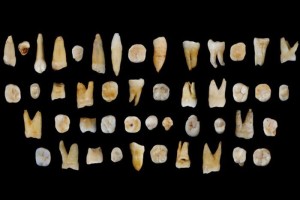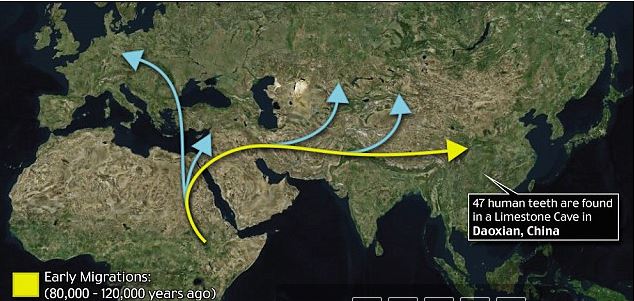Fossil teeth find rewrites story of human migration
The discovery of fossil human teeth in a cave in southern China is changing our understanding of the early migration of humans out of Africa.
The find suggests Homo sapiens trekked into Asia far earlier than previously thought and arrived there much earlier than they did in Europe.
 Scientists this month announced the discovery of 47 teeth from 13 individuals dating to between 80,000 and 120,000 years old, saying they provide the earliest evidence yet of fully modern humans outside Africa.
Scientists this month announced the discovery of 47 teeth from 13 individuals dating to between 80,000 and 120,000 years old, saying they provide the earliest evidence yet of fully modern humans outside Africa.
The teeth, from the Fuyan Cave site in Hunan Province, places humans in southern China 30,000 to 70,000 years earlier than in the eastern Mediterranean or Europe.
Paleoanthropologist Wu Liu of the Chinese Academy of Sciences’ said the find was unexpected and would provoke further study.
“Until now, the majority of the scientific community thought that Homo sapiens were not present in Asia before 50,000 years ago,” Dr Liu told the research journal Nature.
Humans first appeared in East Africa about 200,000 years ago, then spread to other parts of the world, but the timing and location of these migrations has been unclear.

University College London paleoanthropologist Dr Maria Martinon-Torres said our species may have arrived in southern China tens of thousands of years before colonising Europe because of the entrenched presence of rival Neanderthals in Europe and the harsh, cold European climate.
“This finding suggests that Homo sapiens are present in Asia much earlier than the classic, recent ‘Out of Africa’ hypothesis was suggesting: 50,000 years ago,” she said.
Liu said the teeth are about twice as old as the earliest evidence for modern humans in Europe.
“We hope our Daoxian human fossil discovery will make people understand that East Asia is one of the key areas for the study of the origin and evolution of modern humans,” Dr Liu said.
Dr Martinon-Torres said some migrations out of Africa have been labeled “failed dispersals.”
Fossils from Israeli caves indicate modern humans about 90,000 years ago reached “the gates of Europe,” she said, but “never managed to enter.”
It may have been hard to take over land Neanderthals had occupied for hundreds of thousands of years, she said.
“In addition, it is logical to think that dispersals towards the east were likely environmentally easier than moving towards the north, given the cold winters of Europe,” Dr Martinon-Torres said.
Laurie Nowell
AMES Australia Senior Journalist












